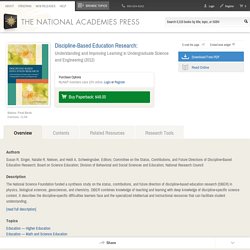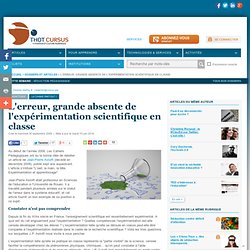

Sciences en société. BOITES NOIRES. [Wenning2014 ] Experimental inquiry in introductory physics courses. Experimental inquiry in introductory physics courses Carl J.
![[Wenning2014 ] Experimental inquiry in introductory physics courses](http://cdn.pearltrees.com/s/pic/th/experimental-introductory-114009632)
Wenning, Ed.D., Department of Physics, Illinois State University, Normal, IL 61790-4560 email: wenning@phy.ilstu.edu Physics teacher educators following national science teacher preparation guidelines will both employ and promote the use of experimental inquiry during instruction. In order for in-service physics teachers to use this form of scientific inquiry appropriately, it is important that they possess a basic understanding of the content, nature, and history of science. Indeed, it is imperative for physics teacher educators and their teacher candidates to have a thorough understanding of experimental inquiry so that they come to value it, are more likely to practice it properly, and understand how to help students achieve a higher degree of scientifically literacy. The effective use of scientific inquiry is one hallmark of outstanding science teachers.
Conducting Scientific Inquiry in the Classroom Table 1.
Discipline-Based Education Research: Understanding and Improving Learning in Undergraduate Science and Engineering. Susan R.

Singer, Natalie R. Nielsen, and Heidi A. Schweingruber, Editors; Committee on the Status, Contributions, and Future Directions of Discipline-Based Education Research; Board on Science Education; Division of Behavioral and Social Sciences and Education; National Research Council The National Science Foundation funded a synthesis study on the status, contributions, and future direction of discipline-based education research (DBER) in physics, biological sciences, geosciences, and chemistry. DBER combines knowledge of teaching and learning with deep knowledge of discipline-specific science content. [read full description] Discipline-Based Education Research is based on a 30-month study built on two workshops held in 2008 to explore evidence on promising practices in undergraduate science, technology, engineering, and mathematics (STEM) education. Discipline-Based Education Research provides guidance for future DBER research.
L'erreur, grande absente de l'expérimentation scientifique en classe. Au début de l'année 2009, Les Cahiers Pédagogiques ont eu la bonne idée de rééditer un article de Jean-Pierre Astolfi (décédé en décembre 2009), publié sept ans auparavant.

L'article s'intitule "L'oeil, la main, la tête. Expérimentation et apprentissage". Jean-Pierre Astolfi était professeur en Sciences de l'éducation à l'Université de Rouen. Il a travaillé pendant plusieurs années sur le statut de l'erreur dans le système éducatif, et cet article fournit un bon exemple de sa position à ce sujet. Constater n'est pas comprendre Depuis la fin du XIXe siècle en France, l'enseignement scientifique est essentiellement expérimental. L'expérimentation telle qu'elle se pratique en classe représente la "partie visible" de la science, censée faciliter la compréhension de phénomènes physiques, chimiques... qu'on peut constater à l'aide d'instruments d'observation et de mesure adéquats.
Une pratique sans surprise, qui ne se suffit pas à elle-même De plus, J.P.
Supporting Modeling Instruction around the USA and the world.